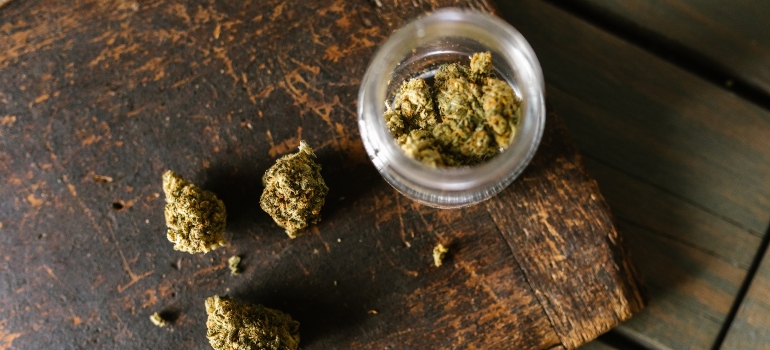In addition to other mental health issues that can develop as a result of substance abuse, substance-induced anxiety disorders are more common than not. These disorders can significantly impact an individual’s quality of life, making it difficult to function and perform everyday tasks. Fortunately, there are various treatments available that can help manage anxiety disorders influenced by substance abuse and promote long-term recovery. Make sure to contact us at Harmony Ridge Recovery Center WV and learn more about the insurance policies and admission process.
What is Substance-induced anxiety disorder, and how it differs from other anxiety disorders
Substance-induced anxiety disorder is a type of anxiety disorder intertwined with addiction to harmful substances. It is characterized by intense feelings of anxiety or panic that are brought on by the use of a substance. This disorder is different from other anxiety disorders because it is directly caused by the use of a substance rather than being caused by a psychological or biological factor.

Difference between Substance-induced anxiety disorder and other anxiety disorders
Substance-induced anxiety disorder is different from other anxiety disorders in several ways. The primary difference is that it is directly caused by the use of a substance, while other anxiety disorders are caused by psychological or biological factors. Additionally, substance-induced anxiety disorder typically occurs only when the person is using or withdrawing from a substance, while other anxiety disorders can occur at any time.
Another difference between substance-induced anxiety disorder and other anxiety disorders is that substance-induced anxiety disorder is typically more short-term than other anxiety disorders. Once the person stops using the substance that is causing the anxiety, the symptoms usually go away. In contrast, other anxiety disorders can be chronic and last for years if left untreated.
Physical and psychological symptoms of substance-induced anxiety disorder
Substance-induced anxiety disorder is a condition in which the use of certain substances can trigger feelings of extreme anxiety, panic, and fear. This disorder typically arises in individuals who have a history of substance abuse or dependency. Both physical and psychological symptoms can occur when someone is experiencing a substance-induced anxiety disorder.

The physical symptoms of a substance-induced anxiety disorder include rapid heart rate, chest pain, sweating, and trembling. These symptoms are often associated with the fight or flight response, which is triggered by the body’s reaction to stress. Other physical symptoms that can occur include difficulty breathing, dizziness, and gastrointestinal distress.
In addition to physical symptoms, a substance-induced anxiety disorder can also lead to psychological symptoms such as excessive worry, fear, and a sense of impending doom. Individuals may experience intrusive thoughts, such as thoughts of harm coming to themselves or others. They may also feel detached from reality or experience depersonalization, which is a feeling of being disconnected from oneself.
Causes of Substance-induced anxiety disorder
Substance-induced anxiety disorder is caused by the use of a substance. This can include drugs such as cocaine, amphetamines, and marijuana, as well as alcohol and some prescription medications. Anxiety or panic attacks occur as a result of the effects that the substance has on the body.
Diagnosis of Substance-induced anxiety disorder
Diagnosing substance-induced anxiety disorder can be challenging because the symptoms are similar to those of other anxiety disorders. However, doctors will typically perform a physical exam and ask about the patient’s history of substance use. If the patient is currently using a substance or has recently stopped using one, and their symptoms are consistent with anxiety or panic attacks, they may be diagnosed with substance-induced anxiety disorder.
Treatment of Substance-induced anxiety disorder
The most effective treatment for substance-induced anxiety disorder is to stop using the substance that is causing anxiety. This can be challenging, especially for people who are struggling with addiction. However, addressing the underlying substance abuse disorder is essential to treat the anxiety symptoms effectively.
In addition to stopping substance use, various forms of therapy for substance abuse can also help manage anxiety symptoms. These may include therapy, medication, and lifestyle changes. Therapy can help individuals identify and address the root causes of their anxiety, while medication can be used to manage symptoms such as panic attacks. Lifestyle changes such as regular exercise, healthy eating, and stress management techniques like meditation can also be helpful.

What illicit substances contribute to anxiety disorder?
Illicit drugs can have a range of negative effects on the mind and body, including causing anxiety and panic attacks. These drugs can alter the brain’s chemistry, leading to an increase in anxiety levels and an increased likelihood of panic attacks.
Cocaine
Cocaine is a highly addictive stimulant drug that can cause feelings of euphoria and increased energy levels. However, it can also cause anxiety, paranoia, and panic attacks. Cocaine works by increasing the levels of dopamine in the brain, which can lead to feelings of intense pleasure and reward. However, it can also cause the brain to become overstimulated, leading to anxiety and panic.
Amphetamines
Amphetamines are a class of drugs that includes prescription medications like Adderall and Ritalin, as well as illicit drugs like methamphetamine. These drugs can cause increased energy levels and feelings of euphoria, but they can also cause anxiety, paranoia, and panic attacks. Amphetamines work by increasing the levels of dopamine and norepinephrine in the brain, which can lead to feelings of pleasure and increased alertness. However, they can also cause the brain to become overstimulated, leading to anxiety and panic.
Marijuana
Marijuana is a psychoactive drug that can cause a range of effects, including relaxation, altered perceptions, and increased appetite. However, it can also cause anxiety and panic attacks, especially in people who are new to using the drug or who use it in high doses. Marijuana works by interacting with the brain’s cannabinoid receptors, which can lead to feelings of relaxation and altered perceptions. However, it can also cause the brain to become overstimulated, leading to anxiety and panic.

Synthetic cannabinoids
Synthetic cannabinoids are a class of drugs that are designed to mimic the effects of marijuana. However, they can be much more potent and unpredictable than natural marijuana, and they can cause a range of negative effects, including anxiety and panic attacks. Synthetic cannabinoids work by interacting with the brain’s cannabinoid receptors, but they can also interact with other receptors in the brain, leading to unpredictable effects.
LSD
LSD is a psychedelic drug that can cause a range of effects, including altered perceptions and a distorted sense of time. However, it can also cause anxiety and panic attacks, especially in people who are new to using the drug or who use it in high doses. LSD works by interacting with the serotonin receptors in the brain, which can lead to altered perceptions and a distorted sense of time. However, it can also cause the brain to become overstimulated, leading to anxiety and panic.
Ecstasy
Ecstasy is a drug that is often used in social settings, as it can cause feelings of empathy and increased sociability. However, it can also cause anxiety and panic attacks, especially in people who are new to using the drug or who use it in high doses. Ecstasy works by increasing the levels of serotonin in the brain, which can lead to feelings of pleasure and increased sociability. However, it can also cause the brain to become overstimulated, leading to anxiety and panic.
Prescription medication
Prescription medications can also cause anxiety and panic attacks, especially if they are misused or abused. Stimulants like Adderall and Ritalin can cause anxiety, paranoia, and panic attacks, especially if they are taken in high doses or without a prescription. Opioids like oxycodone and hydrocodone can also cause anxiety and panic attacks, especially during withdrawal. Benzodiazepines, which are often used to treat anxiety and panic disorders, can also cause rebound anxiety and panic attacks if they are misused or taken for an extended period.
How long-term substance abuse can lead to chronic anxiety
Chronic anxiety is an excessive and persistent worry that can cause significant distress and interfere with daily activities. In other words, chronic anxiety is an ongoing feeling of unease, nervousness, or worry that lasts for several months or even years.

What is chronic anxiety?
Chronic anxiety is a type of anxiety disorder that affects millions of people worldwide. A variety of factors, including genetics, environmental factors, and life experiences, can cause it. Some people may be more prone to chronic anxiety due to their brain chemistry or personality traits. Others may develop it as a result of traumatic events, chronic stress, or ongoing life challenges.
How substance abuse exacerbates chronic anxiety
Substance abuse can be a significant factor that exacerbates chronic anxiety. Many people turn to drugs or alcohol as a way to cope with the symptoms of anxiety, but this can lead to a vicious cycle that worsens the problem over time. Long-term substance abuse can change the way your brain works, making it more difficult for you to cope with stress and anxiety in a healthy way.
Substances such as alcohol, opioids, and benzodiazepines are known to have a calming effect on the body, which is why they are often used to treat anxiety disorders. However, long-term use of these substances can lead to a condition known as a substance-induced anxiety disorder. This condition is characterized by persistent anxiety symptoms that are directly caused by substance abuse.
The link between long-term substance abuse and chronic anxiety
There are several ways in which long-term substance abuse can lead to chronic anxiety. One of the most significant factors is the effect that substance abuse has on the brain’s chemistry. Drugs and alcohol can alter the levels of neurotransmitters in the brain, which can lead to changes in mood, behavior, and thought patterns. Over time, these changes can become permanent, making it difficult for the brain to function normally without the presence of drugs or alcohol.
Another way in which substance abuse can lead to chronic anxiety is through the development of substance-induced anxiety disorder. This condition is more likely to occur in individuals who have a history of anxiety disorders or who are genetically predisposed to anxiety. Substance-induced anxiety disorder can develop after just a few uses of certain substances or after prolonged use. In some cases, the symptoms of substance-induced anxiety disorder can persist even after the person stops using the substance.
Long-term substance abuse can also lead to social and environmental factors that can exacerbate chronic anxiety. For example, individuals who struggle with addiction may experience financial problems, legal issues, and relationship difficulties that can contribute to chronic stress and anxiety. These issues can make it difficult for them to manage their anxiety symptoms and may lead to the development of other mental health conditions such as depression or post-traumatic stress disorder (PTSD).
Duration of drug-induced anxiety
Drug-induced anxiety is a common and unpleasant side effect of drug use. The duration of this type of anxiety can vary depending on several factors:
- The first factor is the type of drug used. Different drugs have different effects on the body and mind and, therefore, can induce different levels and types of anxiety. For example, marijuana-induced anxiety tends to be milder and shorter-lasting than anxiety induced by cocaine or methamphetamine.
- The second factor is the frequency and amount of drug use. People who use drugs more frequently and in larger amounts are more likely to experience anxiety as a result. In addition, the longer a person has been using drugs, the more likely they are to experience anxiety as a withdrawal symptom.
- The third factor is the individual’s physiology and psychological makeup. Some people are more susceptible to anxiety than others due to genetic, environmental, or personal factors. People with pre-existing anxiety disorders, for example, are more likely to experience anxiety as a result of drug use.
Generally speaking, the duration of illicit drug-induced anxiety can range from a few hours to several days. In some cases, anxiety can persist for several weeks or even months after drug use has ceased. The length of time that anxiety persists can depend on the factors mentioned above as well as on the individual’s overall health and well-being.
Treatments for substance-induced anxiety disorders
Keep in mind that individual therapy for addiction is tailored to unique cases and involves a wide range of treatments.
Behavioral therapies for addiction
Behavioral therapies are a type of treatment that focuses on changing negative thought patterns and behaviors that lead to addiction. One of the most commonly used is CBT for addiction treatment. It helps you identify and change negative thoughts and behaviors that contribute to your anxiety and addiction. It also teaches you new coping strategies to help you manage your symptoms and prevent relapse.

Another type of behavioral therapy is dialectical behavior therapy (DBT). DBT is a form of CBT that focuses on teaching you mindfulness, emotional regulation, and interpersonal skills. This therapy helps you develop a greater awareness of your emotions and learn how to manage them in healthy ways.
Dual Diagnosis for addiction
Many individuals who struggle with substance abuse also have a co-occurring mental health disorder, such as anxiety or depression. This is known as the Dual Diagnosis treatment West Virginia centers offer and involves treating both the addiction and the mental health disorder simultaneously.
When you receive dual diagnosis treatment, your mental health disorder is treated alongside your addiction. This approach helps you manage your symptoms and prevents your addiction from triggering your mental health disorder. Dual diagnosis treatment can include medication management, behavioral therapy, and support groups. It can also go hand in hand with holistic therapy for addiction, which produces the best outcome.
Medical detox
Medical detox is a process that involves removing all traces of drugs or alcohol from your body under medical supervision. This process helps you manage withdrawal symptoms safely and comfortably. Medical detox can take place in a hospital or residential treatment facility.
During medication-assisted treatment in West Virginia, you will be monitored by medical professionals who will provide you with medications to help manage your withdrawal symptoms. These medications can include benzodiazepines to manage anxiety and seizures and antipsychotics to manage hallucinations and delusions.
How addiction therapists curate your individual treatment plan
Addiction therapists are trained professionals who specialize in the treatment of substance abuse disorders. When you first meet with an addiction therapist, they will conduct an assessment to determine the severity of your addiction and any underlying mental health disorders that may be contributing to your addiction. The therapist will use this information to create an individualized treatment plan that addresses your unique needs.

Your individual treatment plan may include a combination of behavioral therapies, medication management, and support groups. The therapist will work with you to determine which therapies will be most effective for your situation. They will also help you set goals and develop strategies for achieving those goals.
As you progress through substance abuse treatment in WV, the therapist will monitor your progress and adjust your treatment plan as needed. If you are struggling with a particular aspect of treatment, the therapist may suggest additional therapies or support groups to help you overcome your challenges.
Managing anxiety after rehab
Recovering from addiction is a significant accomplishment, but it is just the first step toward a healthy and fulfilling life. Managing anxiety after rehab can be a challenge, but many effective strategies can help you maintain your sobriety and improve your mental health.
Aftercare treatment
Aftercare treatment is a crucial part of addiction recovery, and it provides ongoing support to individuals after they have completed their primary treatment program. The goal of aftercare treatment is to help you maintain your sobriety and manage any anxiety or stress that may arise during your recovery journey.
Individual therapy is one of the most common forms of aftercare treatment, and it allows you to continue working with a licensed therapist one-on-one. In individual therapy, you can address specific issues and challenges that may be impacting your mental health and recovery. You can also receive personalized guidance and support as you navigate your recovery journey.

Group therapy is another form of aftercare treatment that can be beneficial for managing anxiety after rehab. Group therapy provides a supportive environment where you can connect with others who are going through similar experiences. You can share your thoughts and feelings, receive feedback and support from others, and learn from their experiences.
Structured lifestyle
A structured lifestyle is essential for managing anxiety after rehab. A structured lifestyle includes establishing a routine, setting goals, and maintaining a healthy lifestyle. This can include regular exercise, healthy eating, and getting enough sleep. A structured lifestyle can help you avoid triggers and stay focused on your recovery.
Enjoying new hobbies
Exploring new hobbies and interests can help you manage your anxiety and maintain your sobriety. Engaging in activities such as painting, hiking, or playing music can provide a healthy outlet for your emotions and reduce stress. Finding new hobbies and interests can also help you build new friendships and a sense of community.

Tackle substance-induced anxiety disorders with Harmony Ridge
While substance-induced anxiety disorders can be challenging to overcome, they are not insurmountable. By seeking out proper treatment and support and developing healthy coping strategies, you can learn to manage your anxiety and maintain sobriety. Therefore, make sure to take things one day at a time, be kind to yourself, and reach out for help when you need it. Recovery is possible, and you are capable of achieving it.



